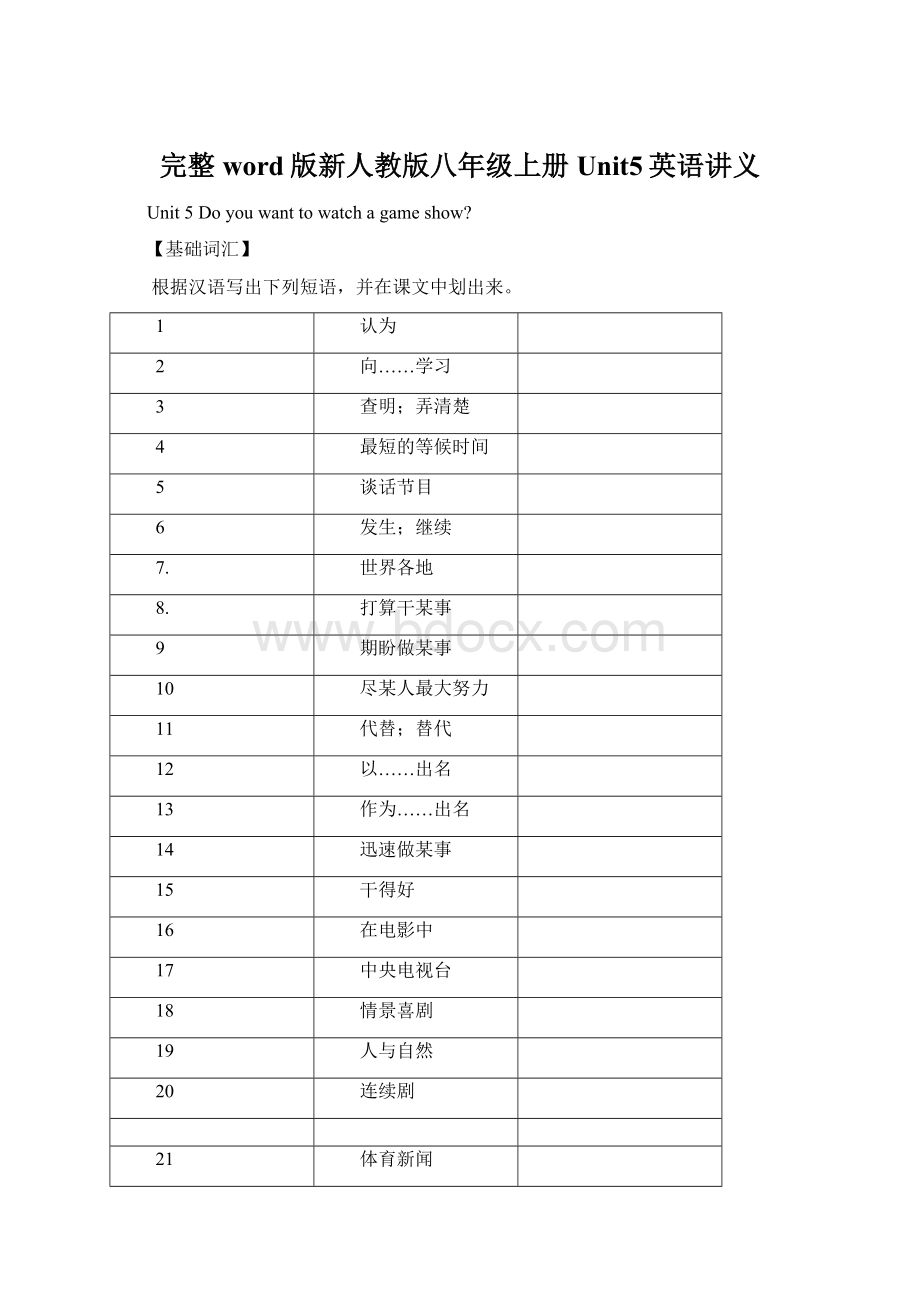完整word版新人教版八年级上册Unit5英语讲义.docx
《完整word版新人教版八年级上册Unit5英语讲义.docx》由会员分享,可在线阅读,更多相关《完整word版新人教版八年级上册Unit5英语讲义.docx(20页珍藏版)》请在冰豆网上搜索。

完整word版新人教版八年级上册Unit5英语讲义
Unit5Doyouwanttowatchagameshow?
【基础词汇】
根据汉语写出下列短语,并在课文中划出来。
1
认为
2
向……学习
3
查明;弄清楚
4
最短的等候时间
5
谈话节目
6
发生;继续
7.
世界各地
8.
打算干某事
9
期盼做某事
10
尽某人最大努力
11
代替;替代
12
以……出名
13
作为……出名
14
迅速做某事
15
干得好
16
在电影中
17
中央电视台
18
情景喜剧
19
人与自然
20
连续剧
21
体育新闻
22
天气预报
23
肥皂剧
24
忍受做……
25
制定一个计划
26
从……学到
27
一天;有朝一日
28
有意义的
29
毫无意义的
30
恐怖电影
31
动作电影
32
行动
33
出版
34
努力去面对
35
不如
36
教育的
37
碰巧做某事
38
精彩的
39
愉快的
40
放松的
41
令人兴奋的
42
无聊的
43
有趣的
44
忘记做某事
45
著名的标志
46
在美国文化中
47
80多年前
48
在20世纪30年代
49
准备做某事
50
有许多困难
51
在1900年11月14日
52
其中一个主要的原因
53
比如
【语法点睛】
询问对某人某事的看法及评价
常用问句句型:
1.Whatdo/does+主语+thinkof...?
Howdoyoulike...?
……认为……怎么样?
Whatdoyouthinkof
comedies?
你认为喜剧怎么样?
WhatdoesSuethinkoftheTVshow?
苏认为这个电视节目怎么样?
2.What/Howabout...?
……怎么样?
Whataboutthebook?
这本书怎么样?
常用答语:
(1)可以用动词like,love,can'tstand,don'tmind构成以下句子:
Ilike/loveit.我喜欢它。
Idon'tmindit.我不介意它。
Idon'tlikeit.我不喜欢它。
Ican'tstandit.我不能忍受它。
(2)也可以用形容词interesting,boring等及表示程度的副词verymuch,alot,alittle等来回答。
Ithinkthebookisveryinteresting.
我认为这本书很有趣。
Ilikeitalittle.
我有点喜欢它。
Ithinkit'saboringfilm.
我认为这是一部无聊的电影。
Ilikeitverymuch.
我非常喜欢它。
【例1】—Whatdoyou______yourhometown?
—Iloveitverymuch.
A.lookatB.talkabout
C.thinkofD.like
【例2】—Whatdoesyoursisterthinkofthefilm?
—______.
A.Shedoesn'tmindthemB.Shelikesthem
C.ShelikesitD.Shedoesn'tlikeher
【例3】—______?
—Oh.Ican'tstandit.
A.HowaboutChineseCooking
B.Whatdoesyourmotherthinkofthebook
C.Whatdoesyourmotherlikethebook
D.Whatdoeshethinkofthebook
SectionA2d
【课本互动】
一、熟读第26页的2d至背诵,合上书本填空。
Grace:
Whatyoudoinclasstoday,Sarah?
Sarah:
WehadaaboutTVshows.Myclassmateslikeand.
Grace:
①Oh,Ican'tthem.Ilove.②Iliketothestoryandseewhatnext.
Sarah:
Well,Idon'tsoapoperas.ButmyTVshowsarethenewsandtalkshows.
Grace:
They're!
Sarah:
③Well,theymaynotbevery,butyoucantolearnalotfromthem.ItobeaTVreporteroneday.
格雷斯:
萨拉,今天在课堂上你们干了什么?
萨拉:
我们对电视节目进行了讨论。
我的同学都喜欢游戏节目和体育节目。
格雷斯:
哦,我不能忍受它们。
我喜欢肥皂剧。
我喜欢跟着故事情节走,看看下一步会发生什么。
萨拉:
噢,我不介意肥皂剧。
但是我最喜欢的电视节目
是新闻和谈话节目。
格雷斯:
它们很无聊!
萨拉:
噢,它们可能不令人兴奋,但是你可以期盼从它们中学到一些知识。
我希望有一天成为一名电台记者。
【重点句型】
1.Whatdoyouthinkoftalkshows?
你觉得谈话节目怎么样?
本句是由what引导的特殊疑问句。
用来征询对方对某人某事的看
法。
也可表示为:
Howdoyouliketalkshows?
WhatdoyouthinkoftheChinesefood?
=HowdoyouliketheChinesefood?
你认为中国菜怎么样?
【例题】Howdoesshelikesitcoms?
(改为同义句)
____________she____________sitcoms?
2.Idon'tmindthem.我不介意。
(1)mindv.介意,通常用于疑问句、否定句中。
可单独使用,也可跟名词、代词或动词�ing形式。
I'mlate.Ihopeyoudon'tmind.
我来晚了,希望你不要介意。
Doyoumindgoingwithme?
你介意跟我一起去吗?
mind可构成句型:
Do/Wouldyoumind+物主代词/代词的宾格+doingsth.?
意为“你介意某人做某事吗?
”
Wouldyoumindmy/meopeningthedoor?
你介意我把门打开吗?
(2)mindn.意见;头脑;心智
Hewantstochangehismind.
他想改变主意。
Eatingmanywalnutsisgoodforyourmind.
多吃核桃对你的头脑有益。
【例1】Wouldyoumindmy______basketballinthegarden?
A.playing B.played
C.toplayD.plays
【例2】Idon't______ifhecanchangehis______.
A.mind;mindB.mind;minds
C.minds;mindD.minds;minds
3.Doyouplantowatchthenewstonight?
你计划今晚看新闻吗?
(1)planv.&n.打算;计划
Tellmeyourvacationplans.
告诉我你的假期计划。
plan作及物动词时,后常接动词不定式、名词、代词、从句等作宾语。
Hehasplannedhowhecangettothesupermarket.
他已计划好怎样去超市。
plan用作不及物动词时可接介词on表示“打算”或“预想到”,后面若出现动词作宾语要用动词�ing形式。
Theyareplanningonmeetingnextmonth.
他们计划下月见面。
(2)newsn.新闻节目;新闻,是不可数名词。
WewouldliketowatchCCTVnewseverynight.
我们每晚都想看中央新闻。
Therearetwopiecesofnewsontheboard.
在布告牌上有两条新闻。
【例1】—Whatdoyouplan______thisweekend?
—I'venoidea.
A.do B.doing C.todo D.todoing
【例2】Thechildrenaremaking______takeatripthissummervacation.
A.plantoB.planon
C.planstoD.planson
【例3】根据汉语意思完成下句
我能看些新闻吗?
CanIwatch____________?
4.BecauseIhopetofindoutwhat'sgoingonaroundtheworld.因为我希望弄清世界上会发生什么事。
本句是复合句。
what'sgoingonaroundtheworld作了findout的宾语。
(1)hopev.&n.希望
作动词时,其后可以接两种形式作宾语:
hopetodo
sth.希望做某事
Ihopetoseeyousoon.我希望快点见到你。
hope+that从句
Ihopethatyouhaveagoodtime.我希望你们玩得开心。
Don'tlosehope.不要失去希望。
(n.
)
(2)hope和wish
二者都有“希望”的意思,但在运用时不同:
hope
其后接动词不定式和从句,不能接sb.todosth.和双宾语。
Ihopetogotocollege.
我希望去上大学。
IhopeIcanvisittheGreatWall.
我希望能去参观长城。
wish
其后可以接动词不定式、从句、sb.todosth.和双宾语。
Hewishedmetogowithhim.
他希望我和他一块儿去。
Wishyougoodluck.
祝你好运。
(3)findout查明;弄清
findout指通过观察、探索而发现事实的真相。
一般指主观有意识的动作。
Thinkitover,andyou'llfindoutthewaytosolvethisproblem.
仔细考虑,你就会发现解决这个问题的办法。
(4)goon继续;发生。
常用短语为:
goondoingsth.=goonwithsth.继续做(同一件)事
Firsthetoldustheimportanceofthework,thenhe
wentontellingushowtodoit.
首先他告诉了我们工作的重要性,然后他继续告诉我们怎样去做。
Hewentondoinghishomework.=Hewentonwithhishomework.
他继续做他的作业。
goontodosth.继续去做(另一件)事
Theywentontotalkaboutanotherproblemafterashortrest.
他们短暂休息后又继续讨论另一个问题。
【例1】Ihopeyou______atonce(立刻).
A.tostartB.starting
C.canstartD.starts
【例2】Mymotherwishedme______forherattheschoolgate.
A.waitB.waiting
C.towaitD.thatwaited
【例3】Mys
choolbagismissing.Canyou______whotookminebymistake?
A.foundoutB.found
C.findoutD.find
【例4】Theywenton______themachinewithoutarest.
A.torepairB.repairing
C.repairedD.repair
【例5】根据括号内所给词的正确形式填空
Afterhefinishedhomework,hewenton______(do)thedishes.
5.①Oh,Ican'tstandthem.哦,我不能忍受它们。
standv.忍受,是及物动词,常用于否定句和疑问句中。
Howcanyoustandher?
你怎么能忍受得了她呢?
standv.站立,是不及物动词,后面可接表示地点或位置的词。
Look!
Mybrotherisstandingunderthetree.
看!
我弟弟正在树下站着。
【例题】They______suchbadfood.
A.standB.can'tstand
C.arestandingD.stood
6.②Iliketofollowthestoryandseewhathappensnext.我喜欢跟着故事情节走,看看下一步会发生什么。
(1)happenv.发生;出现,是不及物动词。
(一般指偶然发生,主语为事,不能为人)
Sth+happens+地点/时间,意为:
某地/某时发生了某事
AnaccidenthappenedonParkStreet.
Theaccidenthappenedoutsidemyhouseyesterday.
事故于昨天发生在我家外边。
(2)知识延伸
①happenv.碰巧,主语可以是人,后常跟动词不定式to,表示“碰巧……”.
Sb+happenstodosth.
Ihappenedtoseemyuncleonthestreet.
Ihappenedtositbyherinthecinema.
在电影院我碰巧坐在她旁边。
②表示某人发生某事用sth.happens(ed)tosb.
Atrafficaccidenthappenedtohiselderbrotheryesterday.
Whathappenedtoher?
=Whatwaswrong/thematterwithher?
她出什么事了?
【例1】Theaccident______arainynightlastJune.
A.happenedonB.happenedin
C.happensonD.happensin
【例2】根据汉语意思完成下句
我碰巧在超市遇到他。
I__________________himinthesupermarket.
7.③Well,theymaynotbeveryexciting,butyoucanexpecttolearnalotfromthem.
噢,它们可能不令人兴奋,但是你可以期盼从它们中学到一些知识。
(1)maymodelv.可以,表示请求或许可,语气比can弱,其否定形式是maynot。
MayIuseyourpen?
我可以用你的钢笔吗?
maymodelv.也许;可能,表示推测
Youcanaskhim.H
emayknow.
你可以问他,他也许知道。
(2)知识延伸
may引出的一般疑问句,其简略回答是“Yes,主语+may”或“No,主语+can't/mustn't”。
—MayIsithere?
我可以坐在这儿吗?
—Yes,youmay.(No,youcan't/mustn't.)
是的,你可以。
(不,你不可以/不准。
)
(3)expectv.预料;期待,后可接名词、代词、动词不定式、that从句或复合宾语(即expectsb.todosth.)。
Iexpecttobebackwithinaweek.
我希望一周内回来。
Ididn'texpecthimtostaysolong.
我没想到他会待这么久。
【例1】—Mary,______Ihavesomemorecakes?
—Certainly,helpyourself.
A.needB.must
C.willD.
may
【例2】—Mayweputtheboxintheroom?
—No,you______.
A.mayB.can't
C.maynotD.needn't
【例3】Myparentsare______ustocomefordinner.
A.expectB.expecting
C.waitingtoD.expectingto
SectionB2b
【课文互动】
熟读第29页的2b并复述课文,根据课文内容填空。
Whenpeoplesay“”,wethinkofartandhistory.①ButoneverysymbolinAmericancultureisacartoon.Weallknowandlovetheblackmousewithtwolargeroundears—MickeyMouse.②80yearsago,hefirst
intheSteamboatWillie.③WhenthiscartooninNewYorkonNovember18,1928,itwascartoonsoundandmusic.ThemanMickeywasWaltDisney.④Hebecamevery
and.Inthe1930s,he87cartoonswithMickey.
Somepeoplemightaskhowthiscartoonanimalbecameso.OneofthemainreasonsisthatMickeywaslikea
man,buthealwaystriedanydanger.⑤Inhisearlyfilms,Mickeywasandhadmanyproblemslosinghishouseorgirlfriend,Minnie.⑥However,hewasalwaystryhisbest.Peoplewenttothecinematoseethe“littleman”win.MostofthemwantedtobelikeMickey.
OnNovember18,1978,MickeybecamethefirstcartoontohaveastarontheHollywoodWalkofFame.Peopletodaytoseemorethanjustalittlemousefightingbadguys,butmanystillknowwhoheis.WhohasapairofearsmorefamousthanMickey's?
当人们说“文化”时,我们会想到艺术和历史。
但是在美国文化中一个非常著名的象征是卡通片。
我们都知道并喜欢那只有两个大大的、圆圆的耳朵的黑老鼠——米老鼠。
80多年前,他首次出现在卡通片《汽船威利》中。
当这部卡通片于1928年11月18日在纽约问世时,它是第一部有声音和音乐的卡通片。
米老鼠背后的人是沃尔特·迪斯尼。
他变得非常富有和成功。
在20世纪30年代,他用米老鼠制作了87部动画片。
也许有人会问为什么这个卡通动物变得如此受欢迎。
其中主要的原因之一是米老鼠像一个普通的人,但是他总是尽力去面对任何危险。
在他早期的电影中,米老鼠是不幸的并遇到了许多问题,诸如失去了房子和他的女朋友明妮。
然而,他总是愿意尽最大努力。
人们去电影院看这“小人”成功。
他们大多数想和米老鼠一样。
在1978年11月18日,米老鼠成为好莱坞星光大道中
的第一个有星的卡通人物。
尽管今天的人们期望看到的不仅仅只是一只与坏家伙作斗争的小老鼠了,但是许多人依然知道他是谁。
谁还会有一对比米老鼠更有名的耳朵呢?
【重点句型】
1.meaninglessadj.毫无意义的;意思不明确的
(1)Whatyoudidismeaningless.
你所做的毫无意义。
less是形容词否定后缀,意为“没有……
的”。
hope→hopeless无希望的;help→helpless无助的
(2)知识延伸
meaningfuladj.有意义的
Plantingtreesinspringismeaningful.
春天种树很有意义。
meaningn.意义;意思
What'sthemeaningofthesign?
这个标志的意思是什么?
【例题】Ican'tknowthe______ofthesentence.Ithinkit's______.
A.meaning;meaningB.meaningful;meaning
C.meaning;meaninglessD.meaning;meaningful
2.①ButoneveryfamoussymbolinAmericancultureisacartoon.
但是在美国文化中一个非常著名的象征是卡通片。
(1)famousadj.著名的;出名的
LiuHuanisafamoussinger.
刘欢是一位著名的歌唱家。
(2)befamousfor...以……而出名
Chinai